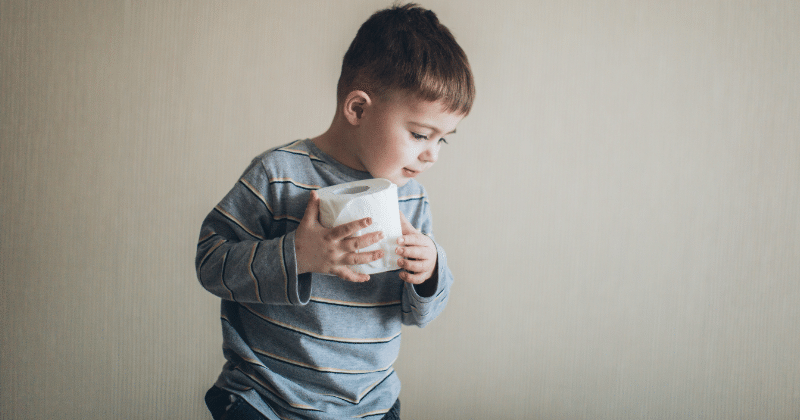When it is difficult to defecate, the stomach will feel uncomfortable. Especially if it is experienced by children who may not be able to communicate their feelings or body condition properly. Usually, children will cry when they find it difficult to defecate.
In medical terms, the condition of having difficulty defecating in children is called constipation or constipation. Parents need to know that children under five generally have a different frequency of defecating. But ideally, toddlers defecate 1-3 times a day.
In knowing the presence of constipation or constipation in children, you can see from the infrequent frequency of defecating. In addition, it can also be characterized by a form of stool that tends to be dry or hard. In fact, it may be accompanied by bleeding when defecating.
Further, here Popmama.com explain the causes of constipation (constipation) along with how to deal with children who have difficulty defecating. Summarized from various sources, Ma.
1. Signs of a difficult child CHAPTER
parenting.firstcry.com—
There are several symptoms that can indicate that your child is having difficulty defecating. The following has been reported from the page WebMD:
- the child complains of stomach pain,
- bowel movements reduced to less than 3 times per week,
- Your child tries to hold out the feces or feces, the sign can be seen from facial expressions, crossing his legs, or turning his body,
- the presence of small stains on children’s underwear, and
- stool or stool that is hard, dry, and doesn’t pass easily.
–
Editors’ Picks
2. Causes of difficult children CHAPTER

Pexels/Elly Fairytale—
Difficulty defecating most often occurs when stool or stool moves too slowly through the digestive tract so that the stool becomes hard and dry. Quoting Mayo ClinicThere are many factors that can cause children to have difficulty defecating, including:
Children who actively play often ignore the desire to defecate so they tend to delay defecating. In addition, your little one may delay defecating because he is afraid to go to the toilet or feels uncomfortable when using another toilet outside the house.
- discomfort when defecating
The presence of pain due to stool that is too hard or dry causes the child to feel uncomfortable when defecating. This allows the child to delay bowel movements because they don’t want the unpleasant experience to happen again.
When parents are too quick to decide to do toilet training, the child may struggle to delay the bowel movements or bowel movements. Frequently delaying the urge to defecate can become a bad habit that disrupts digestion.
A change in diet, such as switching from liquid food to solid food, usually causes constipation. When children are accustomed to eating foods that are mashed into solid foods, such as fruit or vegetables rich in fiber, your little one’s digestive system may be shocked, making it difficult to process these foods, Ma.
Any change in a child’s routine, such as travel, hot or cold weather, or stress can affect bowel function. Children are also more likely to have difficulty defecating when they first start schooling outside the home.
When the child is on treatment, difficulty defecating may appear as a side effect. Medicines, such as certain antidepressants and various other drugs can cause constipation.
Allergies to cow’s milk or consuming too much dairy products, such as cheese and other cow’s milk products, sometimes cause constipation in children.
Children who have family members who have experienced constipation are more likely to experience constipation too, Ma. This may be due to shared genetic or environmental factors.
- the presence of certain medical conditions
Certain medical conditions may cause difficulty defecating in children. Although rare, anatomical abnormalities, metabolic or digestive system problems, or other conditions can be the cause of constipation.
–
3. Overcoming difficult defecation at home

Pexels/Yan—
There are several remedies that you can try at home to treat constipation in children, namely:
- make sure the child is getting enough fluids, most children need about 3-4 glasses of water every day,
- add more fiber to your child’s child’s diet,
- make sure your little one eats enough fruits, whole grains, and vegetables, these fiber-rich foods keep things in the body moving,
- make sure the child does not consume fast food excessively because it can slow down digestion,
- limit sodas and teas because they have a lot of caffeine in them,
- get the child used to defecating regularly, ask the child to try at least 10 minutes for 2 times a day, after eating is a good time, Ma.
If any of the above doesn’t seem to be working, you can consult your pediatrician about using a mild, child-friendly laxative or stool softener.
–
4. Be aware of other symptoms that may be dangerous

Pexels / Polina Tankilevitch—
Constipation or having difficulty defecating is usually not something to worry about in children, but it can sometimes be a sign of a more serious condition. If your child’s constipation lasts for more than 2 weeks, maybe something else is going on.
Make an appointment with a pediatrician, if Mama sees other symptoms when the child is having difficulty CHAPTER, such as:
- swelling in the stomach,
- weight loss,
- stool containing blood,
- fever,
- gag,
- tears on the skin around the anus.
If your child’s constipation is getting worse, the pediatrician may want to do some tests to find out what is causing the problem. The doctor may try the following actions:
Abdominal x-ray uses normal X-rays to check for blockages. This method is most often used to diagnose constipation.
When a barium enema X-ray is done, the intestines are coated with dye so that when there is a problem with the rectum, large intestine or small intestine it will show signs so that it is clearly visible on the X-ray. This method is rarely used by doctors, but sometimes needed.
A rectal biopsy is done by taking a very small tissue sample. This aims to check for abnormal nerve cells in the rectum. However, this procedure is rarely needed.
Mothers need to remember that there are many reasons why children experience constipation on occasion. Usually, there’s nothing to worry about. With a little adjustment, the child can return to normal in no time, Ma.
–
5. How to prevent difficult defecation in children

Pexels/C Technical—
Even though the condition of having difficulty defecating in children often occurs and is quite easy to overcome, Mama can prevent it. There are several ways you can prevent constipation:
-
Get your child used to eating high fiber foods
A diet rich in fiber can help a child’s body form soft, large stools. So, Mama should serve foods that are high in fiber, such as fruits, vegetables, nuts, cereals, and whole wheat bread.
If your little one is not used to high-fiber foods, start by adding just a few grams of fiber a day to prevent gas and bloating. According to the Nutritional Adequacy Rate set by the Indonesian Ministry of Health through the Minister of Health Regulation no. 75 in 2013, the amount of daily fiber needs for children aged 1-3 years is 16 grams per day.
-
Encourage children to drink lots of fluids, Ma
Water is often the best choice. This is because fluids in the body can encourage physical activity. Regular physical activity helps stimulate normal bowel function in children.
-
Create a toilet routine
As much as possible, Mama set aside time after eating so that children get used to using the toilet. If necessary, provide a footstool so that the child is comfortable sitting on the toilet and has sufficient leverage to remove the stool.
Remind children to pay attention to nature calls, such as BAK or BAB. Some children are so absorbed in playing that they ignore the urge to defecate. When such delays occur frequently, it can lead to constipation.
Appreciate children’s efforts, not just fixate on the results, Ma. Give small gifts when the child tries to defecate successfully. Possible prizes include stickers, books, or special games that are only available after (or possibly during) toilet time.
Also, avoid punishing children who get their underwear dirty. Just give a simple understanding so that the child doesn’t repeat. Always remember to be a supportive parent, Ma.
If your child is taking drugs that cause constipation, ask the doctor about other options so that your baby doesn’t have difficulty defecating.
Those are some important information about constipation in children. Accompanied by solutions and ways to prevent them. Hope it can be useful, yes.
Also read:
—


